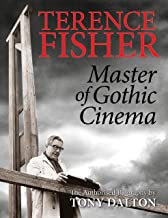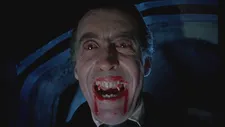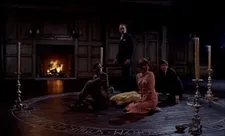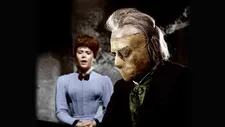 |
| Terence Fisher: Master Of Gothic Cinema Photo: Fab Press Limited |
Terence Fisher, subtitled here, not inaccurately, as 'Master of Gothic Cinema', is probably best known for his role as director of classic Hammer horrors. His career was bound up with Hammer's two great stars, of the twenty odd films where Peter Cushing and Christopher Lee worked together he directed them in six. His legacy is longer than that though, and in Tony Dalton's biography there's a chance to contextualise his work in the development not only of horror as a genre but the evolution of the British film industry.
This is a weighty tome, at 1555g it masses as much as a bottle of Castellum Dracula Merlot and the copy of Frankenstein given to audiences at the 2018 EIFF screening of Mary Shelley. All those elements do feature in Terry's life, some more than others. I had tried to do it with works adapted but even lumping in a copy of Frank Herbert's Dune couldn't come close with what I had to hand in the library. The book is as packed as my kitchen scales were, though as an authorised biography by a friend of the subject it does sometimes feel as if threads have been left unfollowed.
There's information on Terry's early life, his professional life started in the Merchant Marine. There's a reference to a "mysterious" Osborne class at the training school, HMS Conway, but a few minutes work on my part suggests that it was connected to the Royal Naval College, Osborne. Cadets at Conway might receive additional training as at Osborne for consideration for places at the Royal Naval College in Dartmouth. There are other references to an adoptive Doctor and a re-marriage in Africa where details aren't tracked down. For one we've both name and address, so census might have shown more, for the other there's a name that I can only assume is mistranscribed because my searches suggest that nobody has had it.
 |
| Dracula |
Those are possibly borne more from the pedantry that one finds oneself bringing to bear on something so hefty. For sure it's full of photographs, publicity posters for productions, it does make use of a number of earlier interviews from before Fisher's passing to talk about is processes. Once it gets him behind the camera its exploration is achronological - sometimes less by theme than by character - and though there's mention made that Dalton could write a book about The Devil Rides Out alone some films get scarce more than a paragraph.
There's good discussion of technique, though it's often illustrated (if at all) with stills that can be some distance on. There are some entertaining anecdotes, including one about how budget stymied Bernard Bresslaw from becoming a particular beast. There's a lot of discussion of Hammer's economics, the purchase of Bray Studios seems to presage the acquisition of actual houses for Brookside decades later. The chance to see how studio buildings themselves had opportunity as character actors is amusing too. A later section does some inflation calculations, but this isn't consistent. Dracula's budget of £81,000 in 1958 would be £1.93M today, per EFARN figures that's in the (Euro) ballpark of the median fictional film release even now. How many of the more than a thousand films covered by those figures will have the same cultural impact is a different question.
 |
| The Devil Rides Out |
There's discussion near the end of Terry's impact on other directors, including the number of his films selected by Scorsese in the list he sent to Edgar Wright. There's mention of Tarantino, who's clearly happy to talk about other film directors at length, but no interview with any of them. Some of that is probably down to scale - the 504 pages cover a lot already, but not always consistently.
In a chapter of 'What Might Have Beens' there are projects not covered that were mentioned earlier in the text. There are some fascinating potentials in both, but it's unclear what digging was done to identify a mysterious French project that Terry dropped, nor how close we came to having Fisher's version of Dune to go with Jodorowsky's or Lynch's or Villeneuve's. There's also a discussion of a remake of Caligari, and the very idea of it makes me want to know more.
These elements uncovered are somewhat contrasted to the repeated discussions of sexual assault in Terry's films. These are usually characterised as rape, usually described as making Fisher uncomfortable, and sometimes discussed in odd detail. There's discussion of the BBFC's impact (including on projects where the shutter never opened!) and of Peeping Tom, but at times it feels like the imagined requirements of the audience aren't examined. Given how often misfortune found Fisher exploring its depiction in more depth feels warranted. While he seems to have made special habit of following the theatrical instruction to "break a leg" it's not really discussed how ill-fate might have affected what he was able to work on.
 |
| The Phantom Of The Opera |
Terry himself said "one must never be self indulgent when making a film", and while it's a lesson many of his successors would do well to learn it's one his biographer usually avoids. The text does suffer from both distance and proximity, Fisher passed some 40 years ago and Dalton was an is a family friend. The discussion of the films does borrow from critics of the time, and while some punches are not pulled this is written from a fan's perspective. No bad thing for other fans, in truth, and they will benefit from the colour plates and more. As scholarly text, which this perhaps resembles as much as coffee-table companion, it falls short.
That said, time has a way of recontextualising things. Alien being described as "a haunted house in space" was not, at the time, a compliment. There's the skeleton here of a way to view Fisher's work that could well function like Memory as a documentary about film-making, though I don't doubt that rights issues across a directorial CV as long as Terry's would be complicated. I If you are a stranger to these stories there are better introductions. Its subject is pictured on the cover by a guillotine, and one is minded that The Regretful Climb is never a single step. Many though have been set upon that journey. If one has previously been haunted by Hammer and is looking to know more about one of, if not the most prominent of, its authorial/auteurial/arterial voices then this is commended to you.
Terence Fisher: Master Of Gothic Cinema, by Tony Dalton, ISBN 1913051099, is available to buy now.





















